 Petzlover
Petzlover Dutch Shepherd is originated from Netherlands but Posavac Hound is originated from Croatia. Both Dutch Shepherd and Posavac Hound are having almost same height. Dutch Shepherd may weigh 12 kg / 27 pounds more than Posavac Hound. Both Dutch Shepherd and Posavac Hound has almost same life span. Both Dutch Shepherd and Posavac Hound has almost same litter size. Dutch Shepherd requires Moderate Maintenance. But Posavac Hound requires Low Maintenance
Dutch Shepherd is originated from Netherlands but Posavac Hound is originated from Croatia. Both Dutch Shepherd and Posavac Hound are having almost same height. Dutch Shepherd may weigh 12 kg / 27 pounds more than Posavac Hound. Both Dutch Shepherd and Posavac Hound has almost same life span. Both Dutch Shepherd and Posavac Hound has almost same litter size. Dutch Shepherd requires Moderate Maintenance. But Posavac Hound requires Low Maintenance
 The Dutch Shepherd is of Dutch origin, hailing from the Netherlands. They were originally used as herding dogs on the farms, where they became a jack-of-all-trades type of dog.
The Dutch Shepherd is of Dutch origin, hailing from the Netherlands. They were originally used as herding dogs on the farms, where they became a jack-of-all-trades type of dog.
The Dutch Shepherd in those days, 100 odd years ago, were also known as Hollandse Herders.
These dogs are more rare in modern days, but when you do find them, they are being used as police or security dogs, as guides for the blind, or simply as family friends.
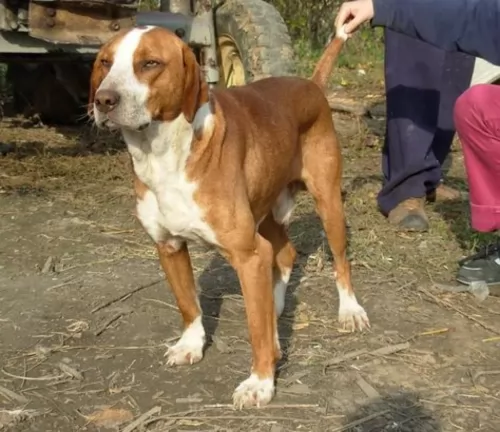 The Posavac Hound originates from Croatia and is believed to have descended from the Molossian.
The Posavac Hound originates from Croatia and is believed to have descended from the Molossian.
The name Posavac Houndare or Posavac Hound was a name bandied about and the name was officially recognized in 1969 by the Federation Cynologique Internationale.
The dog was categorized as a Scent hound. The breed is unrecognised by any of the UK or US Kennel Clubs.
 The Dutch Shepherd dog is very similar in appearance to the popular German Shepherds, being a medium to large sized dog.
The Dutch Shepherd dog is very similar in appearance to the popular German Shepherds, being a medium to large sized dog.
The males are slightly heavier than females, but both males and females can stand between 55 and 62cm and weigh between 20 and 32kg.
There are actually 3 varieties found in the Dutch Shepherd dogs - short-haired, long-haired, and wiry or rough-haired. The dog has a double coat, consisting of a woolly undercoat and a top coat. The basic color of the coat is gold or silver through to red, giving rise to the brindle variations. Too much black or white seen in the fur is considered a fault.
In 1914 it was decided that brindle coats would distinguish them from the others.
The eyes of the Dutch Shepherd are dark, almond shaped and slightly slanting, while the medium sized ears are erect and high on the head and the thick tail is slightly curved. The dog has an unusually long tongue which is often found hanging out.
Early training and socializing for this dog is important so that he can learn to stay calm around new people, or visitors to the property.
The beautiful Dutch Shepherd doesn’t like being left alone for too long, loving rather to be involved with all that the family is involved in. They get on well with other pets in the home as well as being child-friendly.
They are happy dogs, who can also be smart and cunning, therefore highly trainable. They soak up new commands easily. Dutch Shepherds are also good watchdogs as they are fiercely loyal, and do not take kindly to strangers.
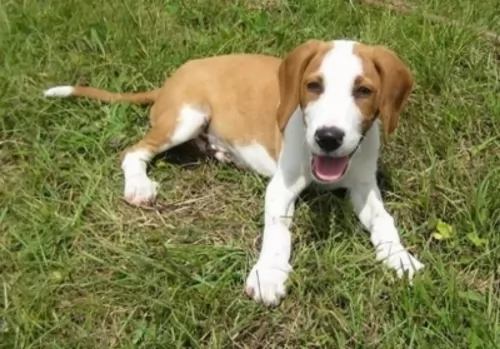 Although the Posavac Hound is a rare dog breed, people who have owned the dog say it should be far better known as it is a gem of a dog.
Although the Posavac Hound is a rare dog breed, people who have owned the dog say it should be far better known as it is a gem of a dog.
The Possie as he is fondly referred to as, is a solidly built dog resembling the Beagle. He stands at between 43 - 59 cm and weighs 16 - 20 kg.
He has long, floppy ears and a kind, gentle expression on his face. The coat is short and smooth, being slightly longer on the stomach and around the back of the legs. The coat color is a wheaten, cream shade. He has bright brown eyes and a long tail, often with a white tip.
The Posavac may look gentle, but in character he is happy and enthusiastic. He makes the most wonderfully faithful, loving dog. He likes to be busy too, game for all kinds of activities but he is intelligent as well. He responds well to training and socialization.
People who have owned this dog say he has a truly amazing temperament, being eager to please his human owner. You’ll find him getting along well with children and other pets in the home.
 Your alert, intelligent and somewhat rare Dutch Shepherd is a loyal, protective dog, and while he can be aggressive around intruders and be a great guard dog, he can also be a gentle, loving animal around his human family members.
Your alert, intelligent and somewhat rare Dutch Shepherd is a loyal, protective dog, and while he can be aggressive around intruders and be a great guard dog, he can also be a gentle, loving animal around his human family members.
Though his tongue is long and often hangs out, you won’t have to contend with drooling. He is a wonderfully active dog and doesn’t easily gain weight. He isn’t a barker or howler, and his exceptional intelligence makes him highly trainable.
Whether there are children or other animals in the house, you can rely on your Dutch Shepherd to get on well with them, making him a wonderful family pet and canine friend.
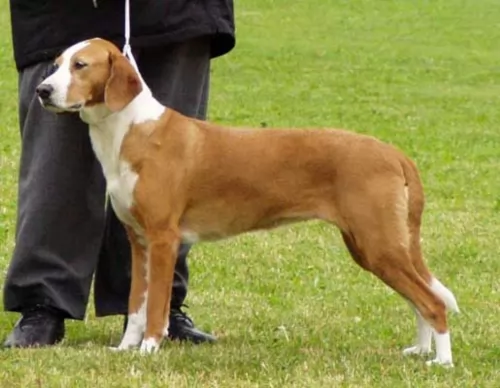 People who have kept the Posavac as a pet say he has wonderful features which make him a sought after canine friend.
People who have kept the Posavac as a pet say he has wonderful features which make him a sought after canine friend.
He has always been a working dog and he is confident and assured, independent, social and friendly. He makes a great friend of children and gets on well with other pets in the house.
He thrives on activities and doesn't want to be left to just lie around ignored. He becomes frustrated and destructive. It wont be the dogs fault but the owners. If you're looking for a lively, friendly, loving dog, you’ll find the Posavac a great addition to your home.
 The Dutch Shepherd dogs are the healthiest of the Shepherd breeds. They have relatively few health problems.
The Dutch Shepherd dogs are the healthiest of the Shepherd breeds. They have relatively few health problems.
However, like the German Shepherds they may develop hip dysplasia, but this is in fact fairly rare. Get your pet to the vet if you suspect this in your dog because it can lead to lameness.
In 2018 the University of Minnesota identified a disease in Dutch Shepherds called Miositis. This is an inflammatory myopathy causing painful inflammation of the skeletal muscle tissue.
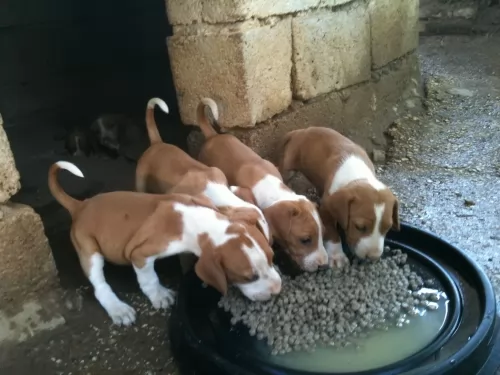 You won’t find many health disorders linked to this lovely dog. He can reach 11 – 14 years of age fairly easily if well taken care of. Of course, his floppy ears pose a bit of a problem.
You won’t find many health disorders linked to this lovely dog. He can reach 11 – 14 years of age fairly easily if well taken care of. Of course, his floppy ears pose a bit of a problem.
It is quite difficult to keep the inside of the ears dry and clean, and this means dirt, wax and moisture can cause bacteria and ear infections.
Because he is also a deep chested dog, he can be prone to bloat. Bloat is when gas collects in the stomach and it twists. You will notice your pet’s abdomen swollen and hard. He will require immediate veterinary attention.
 Unfortunately Dutch Shepherds shed quite a bit of hair during their shedding period in spring and autumn. This makes regular brushing important during these seasons so as to remove the dead hairs, especially from the undercoat.
Unfortunately Dutch Shepherds shed quite a bit of hair during their shedding period in spring and autumn. This makes regular brushing important during these seasons so as to remove the dead hairs, especially from the undercoat.
The wire- or rough-haired variety shouldn’t be brushed but should rather be groomed by a professional groomer every 6 months or so.
Their nails need to be trimmed when necessary, to avoid cracking, splitting, or an injury.
Their ears can be cleaned weekly to get rid of any debris or wax build-up. This, if left, can lead to infection. Brush his teeth 2 or 3 times a week to avoid dental disease which brings on a host of illnesses.
These dogs do need regular exercising, and at the same time need to be physically and mentally stimulated. He is the kind of dog that has been used for herding purpose on the farm and he just craves activity. Take him with you on your walks and include him in ball games, hikes, jogging, swimming or when you go cycling – he is game for all kinds of activities.
The formula for their diet would be that of a medium to large dog with high energy levels. The top commercially manufactured foods have been developed to include all the important vitamins and minerals. Fish oil can also be added to their food to keep the coat shiny.
Add in cooked rice, cooked vegetables and chicken from time to time and be sure to add in some raw meat occasionally to prevent problems with the skin. Always ensure that your pet has fresh, cool water to drink.
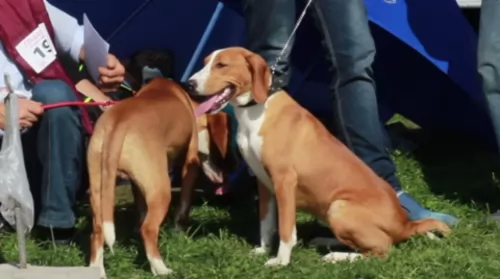 Your Posavac Hound is going to need lots of exercise. He’s used to being a working dog and being kept busy. A good walk will delight him, but it won’t be enough. If you go cycling or riding on a horse, you can count him in to run alongside you. He will also plunge into the swimming pool with you.
Your Posavac Hound is going to need lots of exercise. He’s used to being a working dog and being kept busy. A good walk will delight him, but it won’t be enough. If you go cycling or riding on a horse, you can count him in to run alongside you. He will also plunge into the swimming pool with you.
While he can adapt to life in the city, he is essentially a country living dog, loving to get outside and be active.
Because of the short, smooth coat, and being an average shedder, the Posavac will only require a brush twice a week, so he is fairly low maintenance in terms of grooming.
Check for signs of an ear infection – redness inside the ear and your pet scratching at his ear can be signs,
Trim his nails.
Check inside his mouth for teeth problems. Bad teeth can create a host of problems.
Provide your dog with an excellent diet. It needs to be nutritious food if you’re going with a commercially manufactured dog food. High quality dry kibble can be excellet for your pet, but break the monotony by mixing in some home made food occasionally. Boiled chicken, brown rice or pasta, swee pototatoes, carrots and spinach, al chopped up and mixed in twice week with the drykibble can be awaited twice a week with yur pet. Raw meat added in sometimes can also contibute to your pets health. Feeding a dog doesnt have to be complicated. Dos thrive on consistency and simplicity and this diet will have him healthy ad hapy Make sure he always has a bowl of fresh, cool water available to him.